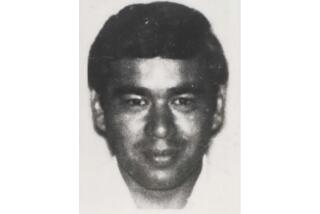Transient, Once Tied to Killing, Beaten to Death in Boyle Heights
Jose Elias Palmas lived on a steep dirt slope, his belongings wedged between the ground and the bottom of a freeway bridge near 7th Street in Boyle Heights.
He died there as well. Brutally beaten with a lead pipe, his scruffy mattress was soaked with blood and surrounded by empty beer cans and Gatorade bottles.
Palmas, a 36-year-old illegal immigrant from Honduras, was one of dozens of men who camp out under the freeways that crisscross Boyle Heights. Most of them emerge at dawn to work as âswampers,â unloading fruits and vegetables at the Central Produce Mart just east of downtown.
âWe call them freeway people,â said Los Angeles Police Detective Larry Martinez of the Hollenbeck Division. âTheyâre not necessarily drunks and lazies. You wonât see anyone out there until 5 p.m., and most of them leave for work by 4 in the morning.â
On June 18, violence broke out in Palmasâ encampment. Palmas and a friend were attacked by four other transients, apparently during a dispute involving Palmasâ radio, police said. The friend, Lorenzo Dario, 34, escaped and went to County-USC Medical Center for treatment, but when he returned the next morning, he found Palmas dead.
This week, police arrested Jose Mendoza, 19, on suspicion of murdering Palmas and attempting to murder Dario. After the attack, Mendoza reportedly told police, he fled to Orange County for a few days. Detectives found Mendoza Tuesday morning sleeping peacefully in a transient encampment a block from the murder scene. Mendozaâs alleged accomplices remain at large.
The Palmas murder is the third Boyle Heights transient killing in about a year, said Martinez. One of those killings occurred last July, only yards from where Palmas was murdered. In that murder, a man known only as Juan was stabbed to death. Two suspects were arrested, but both accused the other of using the knife. With little other evidence, the murder charges were dismissed.
One of the accused in that case was Jose Palmas.
The other man arrested, Agustin C. Camacho, had confessed to dragging the body into the bushes and was sentenced to one year in jail for aiding and abetting in the crime. Palmas was freed, however, and he returned to his home atop the embankment alongside the 7th Street on-ramp to the Santa Ana Freeway.
âI guess what goes around comes around,â said Hollenbeck Detective Robert Suter. âSomeone was guilty of a murder.â
In the July, 1989, murder, Palmas allegedly stabbed the man because he thought heâd stolen his tape recorder. Last weekâs killing, police said, was precipitated a few days earlier, when Palmas accused Mendoza of stealing his radio and threatened him with a knife.
âIt didnât escalate that day,â Suter said, adding that Mendoza apparently âmustered a few friends and retaliated.â
When he was arrested last August, Palmas told police that he had been a âfreedom fighterâ in Nicaragua but tired of the war and came north to the United States, entering the country in June, 1989, Detective Martinez said.
âHe had no family, no relatives up here,â Martinez said. âHe gave a name and an age of a woman he said was his wife, but he refused to say what city (in Honduras) she lived in.â
At the murder scene, playing cards, white shoe polish, toothpaste and an empty black knapsack lay on Palmasâ bloodied mattress. Nearby were boxes of ragged clothes, a tattered Spanish-English dictionary, a carâs rear-view mirror and a brown pocketknife.
In the 1989 murder Palmas was accused of, Camacho told police that Palmas, angered by the theft of his tape recorder, picked up a brown pocketknife, tossed it to the man who would soon be killed, and said, âDefend yourself with it, and Iâll fight with my bare hands.â Palmas cooled down, Camacho said, but later that night, after drinking beer, he again accused the man of stealing his things and stabbed him in the chest.
Palmas told police he witnessed the murder but played no role in it.
âI am innocent,â he said. âOnly God has the right to kill.â
More to Read
Sign up for Essential California
The most important California stories and recommendations in your inbox every morning.
You may occasionally receive promotional content from the Los Angeles Times.










